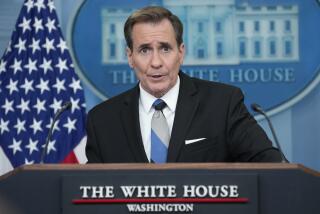U.S. Outlines Modest Goals for Arms Talks
- Share via
WASHINGTON — As Secretary of State George P. Shultz prepared to leave for arms control talks with Soviet Foreign Minister Andrei A. Gromyko, the Reagan Administration said Thursday that it is approaching the meeting with “determination, patience and hope for a productive outcome.”
However, national security adviser Robert C. McFarlane appeared to caution against high expectations of early results as he outlined modest goals for the discussions next Monday and Tuesday in Geneva that seek to end the deepest chill in U.S.-Soviet relations in a generation.
“This is the beginning of a long and complicated process,” involving extremely complex arms control and other issues that “go to the very heart of the national security interests of both countries,” McFarlane said.
‘Establish a Framework’
The United States hopes that the Shultz-Gromyko talks “will facilitate progress for addressing the issues,” he added carefully, and will strive “to establish a framework and process for resuming the bilateral arms control dialogue” with Moscow.
Despite McFarlane’s relatively downbeat tone, a senior Administration official who later briefed reporters seemed to deny reports in the Washington Post that suggested the United States would take a hard opening line in Geneva.
In particular, the official said, although the United States will reaffirm its previous complaint that Moscow has violated the 1972 anti-ballistic missile treaty by building a high-performance radar station in central Siberia, it is unlikely that Shultz will make the alleged violation either “a precondition or special focus” of the two-day meeting.
Similarly, rather than demanding two separate forums for eventual arms negotiations--one to discuss offensive nuclear weapons and the other for defensive systems--the United States is “flexible on the format,” the official said. Defensive and offensive weapons could be considered separately, with a third session discussing “relations between the (other) two,” he added.
This senior official ostensibly could be more forthright under the background briefing rules than McFarlane could be on the record, but he essentially repeated McFarlane’s goals for the talks.
“Our hope is to come away with a framework or process for formal negotiations, and the sooner the better,” the official said. “Whether this comes immediately or requires another meeting or so is less important than that we make some progress toward that end.”
Even before the first meeting takes place, there are rumors circulating in Washington of tentative plans for a second Shultz-Gromyko meeting, possibly to be held in Moscow in two or three months. A White House spokesman denied any firm plans along those lines, however.
‘Constructive Ideas’
McFarlane said the Administration “has constructive ideas” to present at Geneva and promised that U.S. negotiators led by Shultz “will listen carefully to Soviet presentations” with patience and flexibility. He declined to reveal U.S. opening proposals, but they appear to offer little prospect for quick agreement.
The senior official made clear, for example, that Reagan’s “Star Wars” space defense program aimed at erecting a defense network against enemy ballistic missiles--is “not a bargaining chip.” The Soviets have proclaimed their desire to limit such U.S. defense efforts even as the United States seeks to curb Soviet offensive missile arsenals.
The Administration has been unwilling to spell out how the “Star Wars” program fits into their negotiation strategy, and it is unclear whether the officials in charge are being deliberately vague.
The “Star Wars” program has been defined as a research effort that “will remain fully compliant with (ABM) treaty commitments,” the official said. But if the research proves such weapons are feasible, deployment would violate the treaty, he added--although he pledged that the United States would consult with the Soviets as well as its allies before deployment.
Thus, it was premature to discuss limits on deployment of weapons that have not yet been proven feasible, the official said. Instead, the United States was prepared to discuss with the Soviets “the role missile defense systems can play (in complementing offensive missile arsenals) to enhance deterrence,” he said.
Another public Soviet concern is the anti-satellite (ASAT) weapon that the United States is developing to match the existing Soviet ASAT system. Moscow has proposed a moratorium on testing of ASATs, and President Reagan has hinted at adopting “restraints” once arms talks resume.
But the official expressed suspicion of any moratorium. In 1961, the Soviets unilaterally broke a two-year moratorium on atmospheric nuclear tests with a well-prepared series of explosions, he said, and the United States lost ground in weapon development because it had not prepared a similar series.
“The lesson is clear,” he advised. “Be careful on moratoria or you can get snookered.”
More to Read
Sign up for Essential California
The most important California stories and recommendations in your inbox every morning.
You may occasionally receive promotional content from the Los Angeles Times.













